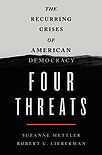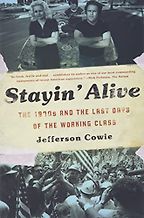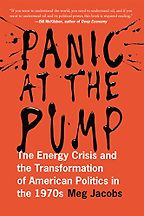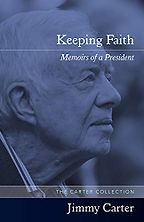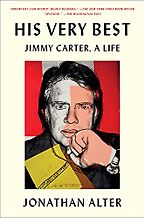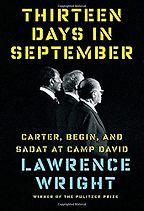Jimmy Carter, the 39th President of the United States (1977-1981), ran as a Washington outsider, a born-again boy from rural Georgia who could redeem the nation during a difficult decade—one plagued by inflation, unemployment and oil shocks, overhung by Watergate and withdrawal from Vietnam, and animated by rising demands for gender and racial inequality. Since the decade is not remembered fondly, it’s no surprise that the president who oversaw the sunset of the seventies was not regarded highly for many years after he lost his reelection bid to Ronald Reagan in 1980.
Your first book is a cultural and political history of the decade. Please introduce us to Vanderbilt historian Jefferson Cowie’s Stayin Alive: The 1970s and the Last Days of the Working Class.
To understand Jimmy Carter and his presidency, it’s important to understand the context in which he was elected and served as president. For a long time, people looked back at the 1970s as an in-between decade. The sixties were the start of the Vietnam war and counterculture, the time of the civil rights movement, student protests and the maturing of the baby boomers. The Eighties were the Reagan era, the beginning of a new conservative regime in the United States. And for a long time, the 1970s were seen as just the transition from the sixties to the eighties. In recent years, historians have been paying more careful attention to what was going on in the seventies and identifying the decade as an important turning point in American politics. That’s what Jefferson Cowie’s book, among others, does.
“There’s no question that he is the greatest ex-president the United States has ever had”
The seventies were a time of economic transition. We begin to see the first inklings of big changes in the American economy. Deindustrialization leads to the disappearance of jobs that had sustained the American working class for most of the 20th century and the hollowing out of cities that used to be industrial powers. This big economic transformation is the thrust of Cowie’s book. Situating the Carter presidency amid the changing economic landscape, the decline of the industrial economy, the slide of the working class and the rise of the service economy in the United States is important to understanding the man and his administration.
Inflation was a huge issue in the seventies. Carter called inflation “the cruellest tax on the elderly and the poor.” How did inflation impact his presidency?
Inflation got especially acute in the last years of the Carter presidency, but it had been an issue earlier in the seventies. These episodes of inflation were triggered by two oil shocks. One began in 1973 with the first OPEC oil embargo; one came later, during the Carter administration. The presidency of Carter’s predecessor, Gerald Ford, who became president when Richard Nixon resigned in 1974, was consumed with inflation as well. Ford waged a “whip inflation now” publicity campaign; people wore buttons that read “WIN: Whip Inflation Now.”
This brings us to another book you recommended: Meg Jacobs, Panic at the Pump: The Energy Crisis and the Transformation of American Politics in the 1970s. Please tell us about it.
Like the Cowie book, Meg Jacobs’s book about the energy crisis of the 1970s does a great job of situating the politics of the era in the longer-run transformations taking place during the decade, particularly our relationship with the Middle East and with imported oil. That’s behind a lot of the inflation in the decade.
In 1977 Carter said, “The energy crisis is real. It is worldwide. It is a clear and present danger to our nation. These are facts and we simply must face them.” Please help us understand the salience of the energy crisis that took place during Carter’s presidency and his much-criticized handling of it.
One of the things that Carter doesn’t get enough credit for is thinking and speaking clearly about the energy crisis, energy challenges, and America’s dependence on the Middle East, which was an increasingly unstable region, for imported oil. He was forthright about the need to conserve energy both for economic reasons and security reasons. In a way, Carter was visionary about these things.
As I said, even before Carter took office, this was a brewing issue. When Carter arrived at the White House, the first energy crisis was just barely in the rearview mirror. He had trouble getting traction in Congress and with the public about these issues. When the second oil shock hit, in 1979, oil prices went up again, sparking big inflation, and it was increasingly harder for him to win that message. But public discussion about the relationship between energy consumption and what we now call climate issues were central to his presidency from its beginning.
Next, you suggest Keeping Faith: Memoirs of a President, one of several memoirs Jimmy Carter has written over the years. Tell us about it.
This memoir was published in the early eighties, shortly after Carter left office. Presidential memoirs are an interesting genre. Sometimes they’re not the most exciting reading but they’re still the first draft of what happened in an administration. Carter’s memoir does give insight into his character. This was a very serious man, a highly ethical person. You mentioned he was a born-again Christian. He trained as an engineer. You see all these facets of the character, and you get his view of the challenges that he faced in his presidency, of the things that he did well and the things that he did less well. It’s a way to understand what happened in his presidency.
While Carter’s memoir could be characterized as modest, Jonathan Alter’s recent biography His Very Best makes bold claims concerning Carter’s greatness. Alter argues that Carter could “fairly claim to be a Renaissance man, or at least a world-class autodidact. Over the course of his life, he acquired the skills of a farmer, surveyor, naval officer, electrician, sonar technologist, nuclear engineer, business-man, equipment designer, agronomist, master woodworker, Sunday school teacher, bird dog trainer, arrowhead collector, land-use planner, legislator, door-to-door missionary, governor, long-shot presidential candidate, US president, diplomat, fly fisherman, home builder, global health expert, painter, professor, memoirist, poet, novelist, and children’s book author-an incomplete list, as he would be happy to point out.” Tell us about His Very Best.
Alter’s book and Carter’s memoir pair together well. From the Carter memoir you get a close-range view of the presidency. From Alter’s book, you get the whole life—the upbringing, the training, the religious background, the self-improvement impulse.
The other important thing about Carter is the post-presidency. Carter’s presidency was partly successful and partly unsuccessful. But there’s no question that he is the greatest ex-president the United States has ever had. One of the things I like about Alter’s treatment is that he gives a lot of attention to the building of the Carter Center at Emory, the way Carter involved himself in global health and election monitoring, the way Carter used his stature, his background, his connections and his prominence to do something constructive. Other presidents either fade into quiet retirement and paint watercolors, like George W. Bush, or hit the lecture circuit, like say Barack Obama or Bill Clinton. Carter didn’t do either of those things. In keeping with what we know about his character, he did his best with the opportunities presented by the post-presidency.
Alter argues that Carter’s “guilt over staying silent during the civil rights movement and not confronting the white terrorism around him helped power his quest for racial justice at home and abroad.” But Carter gained the governor’s house of Georgia in 1970 by criticizing his primary opponent for associating with Dr Martin Luther King Jr. During an interview in 1976, Carter said, “I have nothing against a community that is… trying to maintain the ethnic purity of their neighborhoods.” His remark was intended as supportive of open housing laws, but specifying opposition to government efforts to “inject black families into a white neighborhood just to create some sort of integration.” Your work explores the minefield of race relations in America, can you please help us understand Carter’s confusing record on race?
Carter came up in Georgia politics during an era, in the fifties and sixties, when racial relations were a dividing line in Georgia politics and the Democratic party. (There was no Republican party to speak of in southern states like Georgia until later in the sixties and seventies.) So, yes, he was a temporizer on race. You could not be elected to office in Georgia in the seventies as what we would consider a racial progressive. But Carter was part of a new generation of southern Democratic governors in that era who were aiming at making progress on racial issues and lowering the temperature around the racial divide. And when you contrast him with other prominent Georgia politicians of that era, he looks much better than he does by today’s standards. By the standards of his time, he was looking for a way to make progress on civil rights issues.
Finally, turning to what is widely considered the strong point of Carter’s legacy, his record of peacemaking. You recommend Pulitzer Prize-winner Lawrence Wright’s Thirteen Days in September: Carter, Begin, and Sadat at Camp David. Please tell us about it.
The 1978 Camp David Accords were the single most important accomplishment of the Carter presidency. Wright’s book is both a great overview and a detailed ticktock of the peace process and Carter’s role in wrangling two irascible men, Israeli prime minister Menachem Begin and Egyptian president Anwar Sadat, into doing this historic thing. Given what’s happened in the Middle East, and in relations between Israel and its neighbors since, we tend, in hindsight, to downplay this deal, to see it as superseded by later events. But Israel and Egypt are still at peace, they still have diplomatic relations, and that relationship is still one of the few pillars for peace in the region. This book is key to understanding that event and to understanding the Carter presidency. Wright is an incredible journalist and a phenomenal writer. You can’t put this book down.
What are the other high points of Carter’s peacemaking legacy?
The work that he did promoting democracy after his presidency was so different from George W. Bush’s bombastic militaristic promotion of democracy from the bully pulpit. The Carter Center works in a concerted way to help countries where democracy is budding but fragile, to have free and fair elections that engender confidence in democracy, so when one side wins and the other loses, the electorate and elected leaders accept the results. If you look at events in the world, and even in the United States today, that remains very challenging. The progress the Carter Center made is a real accomplishment.
By putting his boots on the ground, observing elections personally, building homes for folks through Habitat for Humanity, and even wearing a sweater during his presidency while asking Americans to turn down their thermostat, there was something special about how Carter used the power of his personal example.
That’s an important observation. Carter was who he seemed to be, which is not something you often say about successful politicians. It was hard for a lot of people to appreciate that when he was in office. Of course, when Carter came up for reelection in 1980, he was in a very difficult position. The economy was in bad shape, both inflation and unemployment were high. Americans were still held hostage at the embassy in Tehran and the rescue effort that Carter ordered failed. Carter was in an almost impossible position. But, over time, after his presidency, Carter’s character came to shine, and people came to appreciate how he stood out among other ex-presidents.
As you point out, he put his person on the line as an election observer, building homes with Habitat, and through his public health efforts—for instance on Guinea worm disease eradication. Carter was not just sitting in an air-conditioned office in Atlanta pulling strings. He was out demonstrating his commitment, drawing the spotlight to important problems. I think people finally appreciate that commitment.
Interview by Eve Gerber
March 15, 2023. Updated: March 21, 2023
Five Books aims to keep its book recommendations and interviews up to date. If you are the interviewee and would like to update your choice of books (or even just what you say about them) please email us at [email protected]
Five Books interviews are expensive to produce. If you've enjoyed this interview, please support us by donating a small amount.

